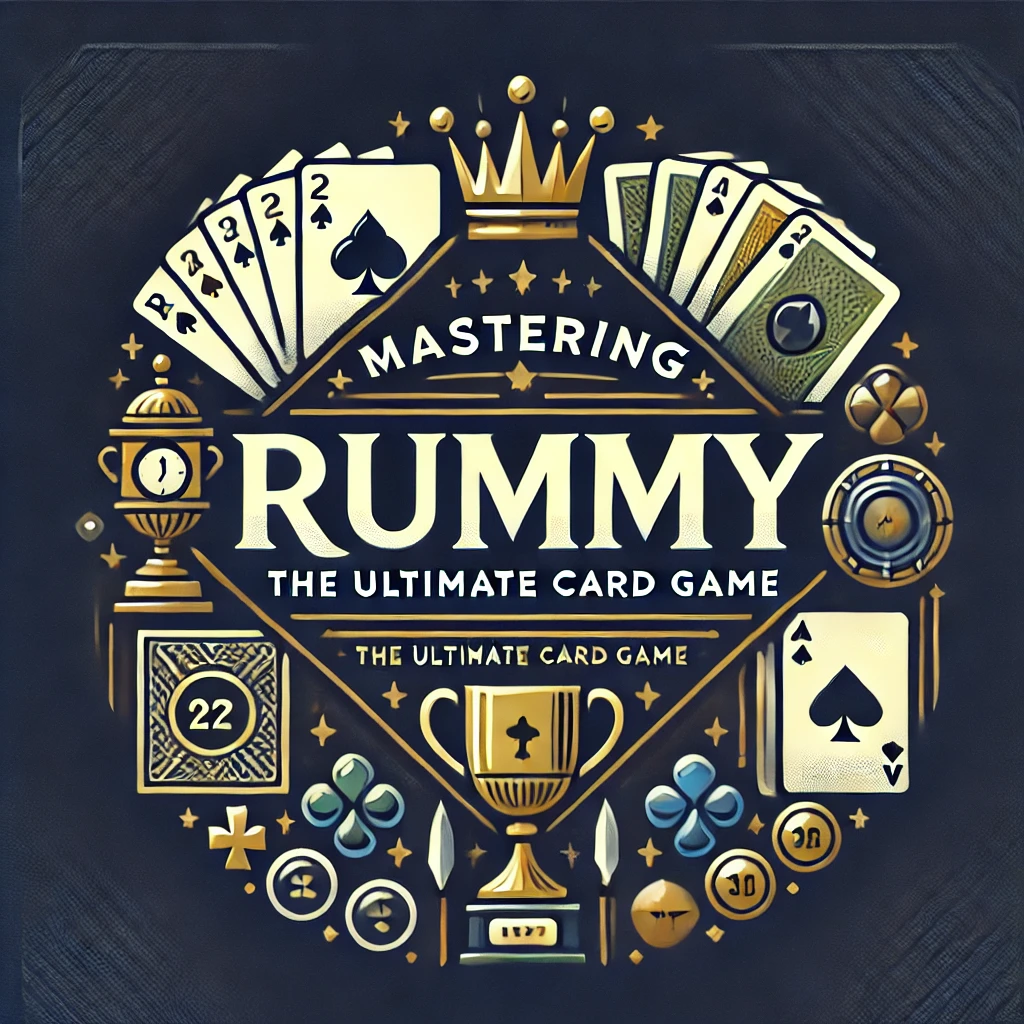Description
The Complete Guide to Rummy: Techniques, Abilities, and Achievement Rummy is a traditional card game that has enthralled players for many years. Both casual players and serious competitors like it because of its unique combination of skill, strategy, and a little bit of luck. In-depth discussions of the principles of Rummy, successful winning tactics, & subtleties that can improve your gameplay are all covered in this extensive guide. This article will offer insightful information about the world of Rummy, regardless of your level of experience or desire to improve your skills. Rummy is essentially a game in which players use a standard deck of cards to form sets and sequences.
Being the first player to merge all of your cards into legitimate combinations—which can include sets (three or four cards of the same rank) and runs (consecutive cards of the same suit)—is the goal. Usually, the game starts with a certain number of cards dealt to each player, with the remaining cards forming a draw pile. Players alternately draw from the discard or draw piles in an effort to create better hands by combining legal combinations. It is essential to comprehend the rules in order to play effectively.
In addition to strategically managing their own hands, players must monitor the movements of their opponents. Depending on the kind of rummy being played, there are a few minor differences in the rules between the two-player and multiplayer versions of the game. Knowing these guidelines will improve your gaming experience & provide the foundation for creating increasingly complex strategies as you advance.
Players need to build a strong strategy that includes both offensive and defensive play if they want to succeed at rummy. Keeping an eye on your opponents’ moves while concentrating on creating melds as fast as you can is one strategy that works well. You can learn a lot about their hands and modify your approach by monitoring the cards they pick up and discard. You can take advantage of this information if you observe, for example, that an opponent is not pursuing that suit for their melds if they are discarding cards of that suit.
Card management is a crucial component of a successful strategy. While keeping cards that can assist them in creating their own combinations, players should concentrate on melding cards that are less likely to be helpful to their opponents. Making deliberate choices about which cards to keep & which to discard is frequently required for this. Also, it can be beneficial to be adaptable in your approach; if your first plan of action proves unsuccessful, be ready to change course and modify your gameplay in response to the game’s changing dynamics.
The ability to bluff is a crucial Rummy skill that can greatly increase your winnings. Although skill and strategy are the main components of Rummy, the psychological component is also important. You can influence your opponents’ choices & even pressure them into making mistakes by casting doubt on your hand. You could give your opponents the impression that you are following a completely different strategy if, for instance, you routinely discard cards that appear unimportant but could be a part of a possible meld. Being composed and not giving away any clues about your true intentions are essential for bluffing in rummy. This involves paying attention to your facial expressions and body language when playing the game.
Also, think about changing up your style of play from round to round. For example, if you usually play conservatively, starting with an aggressive bluff can surprise your opponents. Ultimately, being able to read your opponents’ reactions as the game progresses & having a deep awareness of their tendencies are essential for successful bluffing. The ability to identify patterns and sequences in your hand is a basic component of rummy. This ability entails not just spotting possible melds but also comprehending the interactions between various cards.
It could be advantageous to concentrate on creating a run by drawing more cards from a specific suit, for example, if you have multiple cards in that suit. On the other hand, you might try to make a set if you have several cards of the same rank. Gaining the ability to identify patterns will greatly improve your ability to make decisions while playing. It can also yield important information about possible sequences and melds if you pay attention to the cards that have been discarded. You can determine your opponents’ tactics and modify your own by keeping an eye on the cards they routinely pick up or discard. By keeping cards that your opponents might need for their melds, you can disrupt their plans in addition to improving your ability to make winning hands.
Rummy’s crucial element of discarding has a significant impact on the game’s result. Choosing which cards to discard can either increase your chances of winning or unintentionally give your opponents important information. Discarding high-value cards when you are certain they won’t add to your current hand is a popular tactic because it reduces the possibility of giving opponents points if they later manage to meld those cards. Also, give careful thought to when to discard items. An opponent may change their strategy in response to your discarding a card they have already picked up, which can indicate that you are attempting a similar meld. On the other hand, keeping some cards longer than is necessary could give opponents a chance to take advantage of your hesitation.
To increase your chances of winning at rummy, you must strike a balance between aggressive discarding and strategic retention. Comprehending the Multifaceted World of Rummy. Rummy is a complex game with many variants, each with its own set of rules and strategies. Indian Rummy, Gin Rummy, and Kalooki are a few well-liked variations that each present unique difficulties and tactics.
While Indian Rummy frequently incorporates more intricate rules pertaining to jokers and wild cards, Gin Rummy, for example, places an emphasis on rapidly forming melds while minimizing deadwood (unmatched cards). Investigating Variations to Improve Your Skills. Examining these variations can improve your comprehension of the game and offer new insights into strategy.
Players can also modify their skills to fit different situations by playing different variations of Rummy. Depending on its unique rules and goals, each variation might call for a different approach. Developing into a Multifaceted Rummy Player. In addition to expanding your gaming experience, learning various variations of Rummy makes you a more adaptable player who can confidently take on a variety of challenges.
By navigating various game situations and opponents, this flexibility helps you become a more proficient and well-rounded Rummy player. Even though strategy and skill are important in rummy, luck is an unavoidable element that can affect how any game turns out. Even the most experienced players may occasionally find themselves at the mercy of chance due to the randomness of card distribution.
Successful players, on the other hand, learn to take advantage of fortunate circumstances rather than seeing them as a barrier. Take advantage of the chance to swiftly meld and exert pressure on your opponents, for instance, if you draw a card that precisely matches your hand. Long-term success in rummy also depends on keeping a positive outlook in the face of adversity. Make the best choices you can with the cards you have at your disposal rather than moping about misfortune or lost chances.
Your gameplay is improved by this resilience, which also makes it more fun for you and your other players. It is difficult to duplicate the feeling of accomplishment that comes with winning at Rummy in other games. An exciting atmosphere is created at the table by the excitement of successfully melding all of your cards before your opponents do. Honoring these wins, no matter how minor, can improve the game’s overall appeal and promote player unity. In addition to reinforcing positive experiences, sharing anecdotes about noteworthy victories or talking about tactics that contributed to success can foster learning and development among the group. Your rummy journey can also be made more exciting by establishing personal improvement goals.
Every game can feel more meaningful when you track your progress, whether it’s learning a new variation or perfecting a particular tactic. Ultimately, you will gain a deeper understanding of Rummy as a dynamic game that blends skill, strategy, & social interaction if you embrace both wins and challenges. In summary, Rummy is a complex combination of strategy, psychology, and chance that surpasses simple card games and provides countless chances for development and enjoyment. Players can improve their gameplay and fully enjoy everything that this classic game has to offer by comprehending its rules, creating winning strategies, becoming proficient at bluffing, identifying patterns, discarding sensibly, experimenting with variations, using luck, & celebrating wins. Whether you play rummy with friends or compete in more competitive settings, the skills you learn will surely improve your gaming repertoire and social interactions for years to come.



